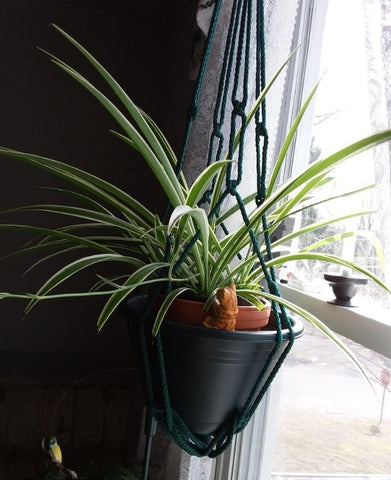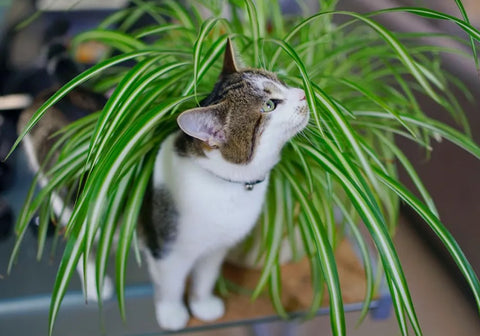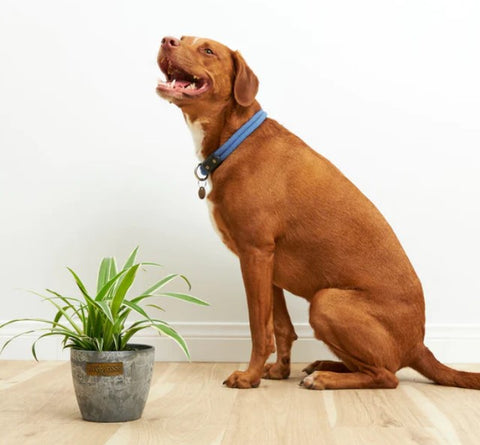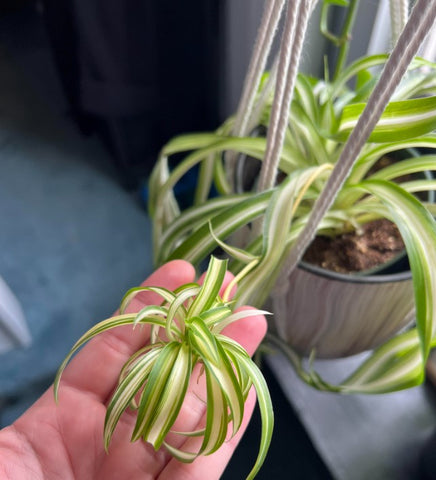Gift Card Balance
Enter the code below to redeem your gift card

With their cascading variegated foliage, spider plants can be a gorgeous addition to your indoor garden. These low-maintenance plants purify the air and have a great aesthetic appeal, making them one of the best houseplants to grow.
But if you share your home with a furry friend, which loves to nibble on everything it sees, you might wonder if this green beauty is safe for pets.
So, is spider plant toxic to cats and dogs? Well, there's good news! The spider plant is not considered poisonous to animals, as it contains no chemicals that make it dangerous to cats, dogs, or other pets.
Still, this doesn’t mean allowing your canine or feline companion to ingest large amounts of this indoor plant, as they may experience some mild side effects.
So, keep reading to learn how to ensure your pets’ safety around houseplants and apply prevention measures to keep their well-being intact.


Spider plants, or Chlorophytum comosum, are native to the forests of Southern Africa. They can bring a touch of the tropics to your home or office. Caring for your spider plant is an easy and rewarding experience, as it requires relatively minimal attention. Ensure your spider plant receives bright, indirect light and water it when the soil feels dry, and it will feel happy and thrive for years to come without any issues.
This tropical plant has different varieties, including the classic variegated spider plant, which boasts fronds with white streaks in the center and green edges. The reverse variegated spider plant, on the other hand, has light green foliage with white edges. Both variants look gorgeous in hanging plant displays, which is also an effective way to keep them away from curious pet animals.
Spider plants might be a popular choice for your indoor green corner. But it’s reasonable to wonder if it’s safe, as many plants produce toxins as a defense mechanism. Thankfully, spider plants are free from poisonous substances that might harm animals or humans.
Spider plants are overall pet-friendly plants. They don’t contain toxins that can harm domestic animals if they bite or touch the plants, nor do they have spikes, thorns, or other physical features that can cause pain. They are also free from pollen or other allergens that can cause reactions if inhaled or touched.

Spider plants do not contain any harmful biologically active chemical substances that can be toxic to cats. So, they are non-toxic to your feline babies. Nibbling on these plants won’t hurt them, though eating large amounts can cause digestive problems. So, you should still apply caution if your cat shows interest in your spider plant. Moreover, the Chlorophytum comosum plant is mildly hallucinogenic to cats, hence, they find their foliage irresistible.
Cats may want to play with the spider plant’s leaves and bite into a few of them playfully. They have a lively, curious nature and are naturally drawn to the dangling fronds, runners, and baby spider plants (spiderettes) used for propagating the spider plant. Also, cats are renowned for chewing on greens to help them expel hairballs.
Your feline friend might also display obsessive behavior and fascination with your spider plant, due to its hallucinogenic properties. Naturally, once your cat ‘tastes’ the pleasure, it will keep coming for more.
While the absence of toxins makes the spider plant cat-safe, it isn’t a healthy snack for your beloved pet. Ingesting large quantities can lead to mild gastrointestinal issues. They can experience an upset stomach or vomiting.
Even if your indoor plants are all pet-safe, prevent your furry friends from making a meal out of them. Placing the plants in a spot inaccessible to your cats, such as hanging planters, is best.
Use a natural spray with a strong smell that they don’t like, such as neem oil or lemon. Spritz it on and around the plants to deter your cat. You can also put net fencing around your houseplants.

The spider plant is one of the safest plants for a house with dogs. It doesn’t contain chemical elements that can harm dogs if they take a bite or two, making it non-toxic. However, it’s best to prevent dogs from eating houseplants in large quantities to avoid digestive issues.
If your dog eats part of your spider plant, especially in large quantities, it can experience gastrointestinal discomfort. The digestive tract of a carnivore, like a dog, can’t process big amounts of greens ingested in one go. So, your canine friend may fall ill, start vomiting, or get diarrhea. Take your pet to the vet if you suspect serious side effects.
Since spider plants are non-toxic and safe for dogs, there’s no harm in growing them in your home if have a canine pet. But it’s best to keep houseplants out of your curious pup’s reach.
Doing so will help avoid digestive issues, in the case of accidental excessive consumption. Your indoor plants will also look their best and healthy when their leaves aren’t torn or chewed on by your dog.

The absence of toxins makes the spider plant safe not only for cats and dogs but also for humans. If you have a toddler with the habit of taste-testing everything, spider plants won't harm them. However, munching on this plant in large amounts is also not recommended.
Spider plants don’t release harmful compounds. They also don’t have damaging physical characteristics like sharp thorns or prickly spikes. So, these plants are safe to touch, as their fronds are gentle to the skin. Whether it’s your child grabbing the stems of a spider plant or you replanting or pruning it, this gorgeous air-purifying beauty will not cause any injury.
A: The Boston fern does not produce toxins that can harm cats and dogs. So, it is an excellent choice for a home with pets. If they eat a part of the foliage, they won’t suffer serious side effects. Still, ingesting large amounts of the plant may cause mild digestive issues in your cat or dog.
A: The ZZ plant is toxic to dogs and cats as it contains calcium oxalate - sharp, needle-like crystals. If an animal bites or touches the plant, the crystals in the sap can harm the oral cavity and digestive tract. They can cause pain, swelling, irritation, etc.
A: A gorgeous evergreen houseplant, the English ivy is poisonous to cats and dogs. All parts of this plant, including its sap, contain poisonous substances called polyacetylene and hederagenin. So, it is toxic to touch and ingest and should, therefore, be kept away from pets.
A: No, the Cast Iron plant is not toxic for cats and dogs. It does not contain any harmful compounds. Still, you should keep houseplants out of reach of curious pets to prevent digestive problems.
A: Lucky bamboo plants contain toxic chemical compounds called saponins. If your cat or dog ingests this plant, the saponins can irritate the mouth, stomach, and intestines. This can lead to vomiting, drooling, loss of energy and appetite, and other symptoms.

Since the spider plant is not toxic to your pets, it’s their ideal roommate. However, beware that carnivores like cats and dogs are prone to mild digestive issues if they consume too much greens.
The same goes for other pet-friendly plants, like the Money tree, Peacock plant, African violet, etc., which can have the same effect on animals. So, maintain a healthy distance between your pets and your indoor green corner or porch container garden to ensure the well-being of your furry and green companions alike.